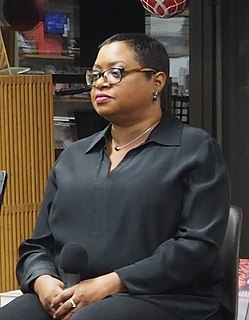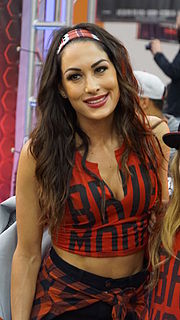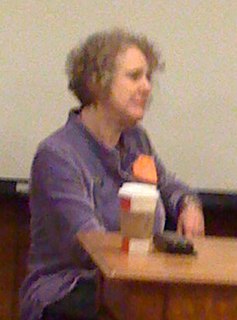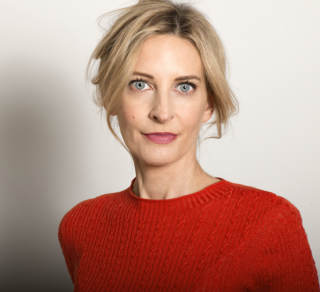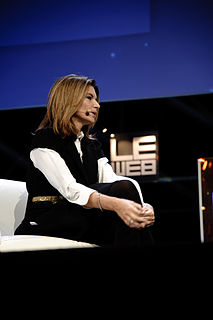A Quote by James Frey
On the other couch a women sits with a young boy looking through a picture book about Babar the Elephant. When I find a magazine and I lean back to start reading it, I can see the women watching me out of the corner of her eye. She moves closer to the child and she leans over and kisses his forehead. I know why she does it and i don't blame her.
Related Quotes
She laughs and looks out the window and I think for a minute that she's going to start to cry. I'm standing by the door and I look over at the Elvis Costello poster, at his eyes, watching her, watching us, and I try to get her away from it, so I tell her to come over here, sit down, and she thinks I want to hug her or something and she comes over to me and puts her arms around my back and says something like 'I think we've all lost some sort of feeling.
She sat leaning back in her chair, looking ahead, knowing that he was as aware of her as she was of him. She found pleasure in the special self-consciousness it gave her. When she crossed her legs, when she leaned on her arm against the window sill, when she brushed her hair off her forehead - every movement of her body was underscored by a feeling the unadmitted words for which were: Is he seeing it?
When I looked at [Fannie Lou] Hamer and that speech it seemed to me that she had to be the bravest woman ever, to come before that body and to assert her rights, when she knew that she was going lose that battle. But she did it anyway, because she knew she was speaking not just for herself and for that day, but for me, and for all the other young women who were coming behind her. She didn't know our names, but she was working for us. I find that incredibly empowering.
My mother didn't feel sorry for herself, she was left with no child support, no alimony at a very young age, with a child to raise, a high school education and she just figured it out. She didn't complain, she didn't rely upon government, she relied upon her own skill set, her own self confidence, her own drive in moxie and her own duty to me and her and she relied upon her family and her faith.
Marylou was watching Dean as she had watched him clear across the country and back, out of the corner of her eye--with a sullen, sad air, as though she wanted to cut off his head and hide it in her closet, an envious and rueful love of him so amazingly himself, all raging and sniffy and crazy-wayed, a smile of tender dotage but also sinister envy that frightened me about her, a love she knew would never bear fruit because when she looked at his hangjawed bony face with its male self-containment and absentmindedness she knew he was too mad.
Gabriel pulled her over his body to lie on the bed beside him. His kisses pressed her down into the oblivion of the mattress as her hands explored his chest, his shoulders, his face. "I want to lay my kill at your feet," he said, more growl than words, and held her tight by her hair as he marked her neck with his teeth. She writhed against him. She wanted to bite him, she wanted to rip the flesh from his back, but most terrible of all, she didn't want him to stop. Her back arched, her body shattered, she howled.
Women are looking out for other women and their children. There are some great nannies, and there are some horrible nannies. And I don't blame individual women for wanting to keep an eye on it. I blame the government for not having subsidized high-quality day care. Should it be on a woman no matter how rich she is to be a one-woman show where she finds the nanny, interviews the nanny, does a psychological evaluation of the nanny, supervises the nanny? It's criminal how little America cares about child care, which is to me the pressing issue of our nation.
Once upon a time there was a girl who wanted to put her fist through a mirror. She would tell everyone it was so that she could see what was on the other side, but really, it was so that she wouldn't have to look at herself. That, and because she thought she might be able to steal a piece of glass when no one was looking, and use it to carve her heart out of her chest.
I'm looking for a writer who doesn't know where the sentence is leading her; a writer who starts with her obsessions and whose heart is bursting with love, a writer sly enough to give the slip to her secret police, the ones who know her so well, the ones with the power to accuse and condemn in the blink of an eye. It's all right that she doesn't know what she's thinking until she writes it, as if the words already exist somewhere and draw her to them. She may not know how she got there, but she knows when she's arrived.
Over and over again, stories in women's magazines insist that women can know fulfillment only at the moment of giving birth to a child. They deny the years when she can no longer look forward to giving birth, even if she repeats the act over and over again. In the feminine mystique, there is no other way for a woman to dream of creation or of the future. There is no other way she can even dream about herself, except as her children's mother, her husband's wife.
Yet losing him seemed unbearable. He was the one she loved, the one she would always love, and as he leaned in to kiss her, she gave herself over to him. While he held her close, she ran her hands over his shoulders and back, feeling the strength in his arms. She knew he’d wanted more in their relationship than she’d been willing to offer, but here and now, she suddenly knew she had no other choice. There was only this moment, and it was theirs.



